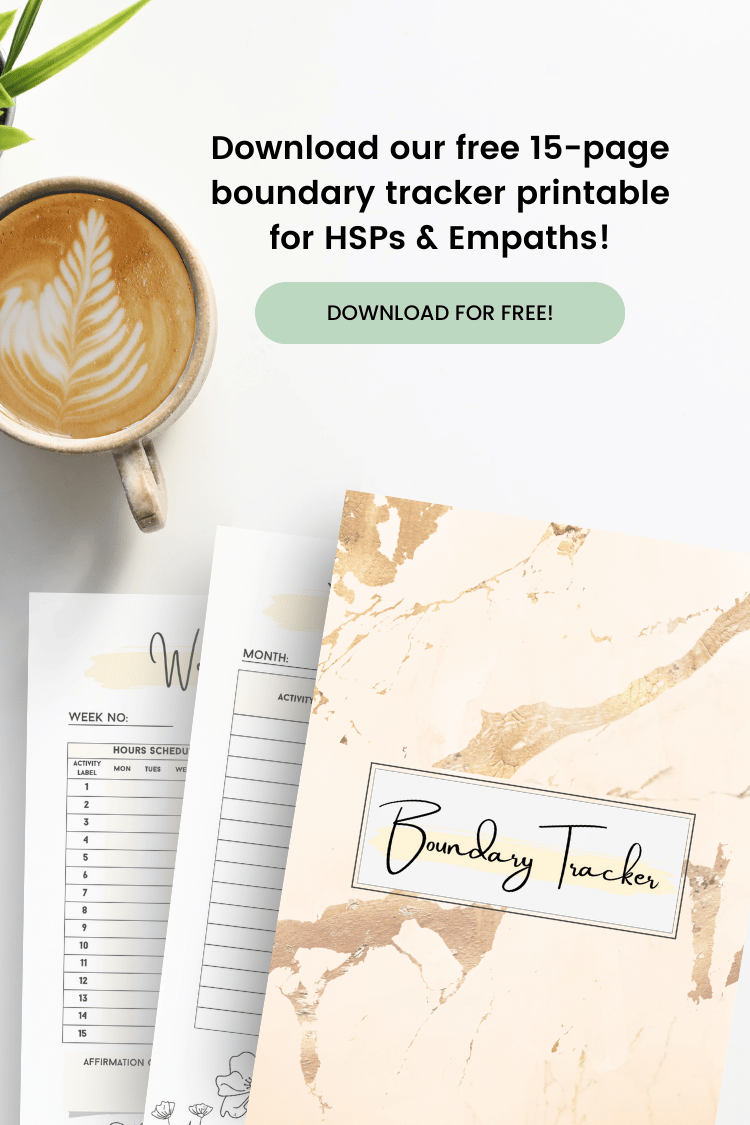Wondering which situations overwhelm highly sensitive people? In this article, we share 10 common triggering situations for HSPs.
Hey there, lovely readers! We want to be completely transparent with you. Some of the links in this blog are affiliate links, which means if you click on them and make a purchase, we may earn a small commission at no additional cost to you. 😊
We only recommend products and services we genuinely believe in and have personally used or researched. Your support through these links helps us keep bringing you valuable content, so thank you for being amazing!
Estimated reading time: 12 minutes
The concept of being a Highly Sensitive Person (HSP) is not just a label; it’s a window into a richly intense way of experiencing the world. For HSPs, every sound, sight, and emotional nuance is amplified. This heightened sensitivity, while a gift that allows for deep empathy and creativity, also comes with its set of challenges. Navigating through life’s inevitable changes and bustling environments can often feel like traversing a minefield, with overwhelming sensations lurking at every turn.
This blog aims to illuminate ten particular situations that can provoke overwhelming feelings in HSPs. From the cacophony of busy crowds to the emotional turmoil of personal conflicts, we delve into why these scenarios are particularly impactful. Moreover, we offer strategies to help HSPs navigate their waters with grace. Understanding and managing these triggers is crucial for HSPs to not only cope but thrive in a world that often feels too loud and too fast.
Here’s What You’ll Discover
- #1 Busy Crowds
- #2 Loud Spaces
- #3 High-Pressure Work Environments
- #4 Emotional Conflicts
- #5 Overstimulating Media Consumption
- #6 Intense Personal Criticism
- #7 Sudden Changes or Uncertainty
- #8 Multitasking and Rapid Deadlines
- #9 Social Overcommitment
- #10 Neglecting Self-Care
- Final Remarks
- Ready to Tackle Overwhelm as a Highly Sensitive Person?
#1 Busy Crowds
For Highly Sensitive People, navigating through busy crowds is akin to being caught in a storm of sensory input. The sheer volume of people, coupled with the cacophony of sounds and flurry of movements, can quickly become a deluge, overwhelming an HSP’s sensitive processing system. It’s not just the noise or the physical proximity of others; it’s the bombardment of stimuli that leaves little room for internal quietude. However, crowds are an unavoidable part of life, and as such, developing strategies to mitigate their impact is essential.
One effective approach is to plan outings during less congested times, allowing for a more manageable experience. When that’s not possible, creating a personal buffer zone can help. This can be achieved by using noise-canceling headphones to drown out the chaos or focusing on a calming object, like a book or a smartphone, to divert attention from the overwhelming environment. For HSPs, the goal isn’t to avoid crowds entirely but to navigate them in a way that honors their need for sensory moderation. By doing so, they can engage with the world without losing themselves to sensory overload.
#2 Loud Spaces
For a Highly Sensitive Person, the assault of noise in loud spaces isn’t merely inconvenient. It can be physically and emotionally draining. The blare of traffic, the buzz of fluorescent lights, or the din of a crowded restaurant doesn’t just fade into the background as it might for others. Instead, it invades an HSP’s senses, often leading to feelings of anxiety or even distress. The challenge lies not only in the volume but in the inability to escape the relentless barrage of sounds.
To reclaim some sense of peace, HSPs can arm themselves with tools like earplugs or noise-canceling headphones. This creates a sanctuary of silence amidst the chaos. Furthermore, seeking out quieter venues for social gatherings or choosing off-peak hours to visit noisy places can help minimize exposure. It’s also beneficial for HSPs to communicate their needs to friends and family, advocating for environments that respect their sensitivity. By taking these proactive steps, HSPs can better manage their environment. This allows them to participate in the vibrant tapestry of life without becoming overwhelmed by its volume.

#3 High-Pressure Work Environments
The fast-paced deadlines and constant demands of high-pressure work environments can feel like a tightrope walk for Highly Sensitive People. In such settings, the stakes always seem high, and the room for error feels nonexistent. For HSPs, this pressure is magnified by their deep processing of every detail and their heightened emotional responses to criticism or conflict. The key to thriving in these environments is not to harden oneself against sensitivity but to find ways to harness it.
Creating a personal oasis at work, whether through a clutter-free workspace adorned with personal mementos or the use of calming sensory aids like essential oils, can provide a much-needed retreat. Negotiating for flexible deadlines or the opportunity to work remotely can also alleviate the sense of constant urgency. Moreover, HSPs can leverage their empathy and attention to detail to excel in their roles. Consequently, they can turn their sensitivity into a professional asset. Building a network of understanding colleagues who appreciate the strengths of being an HSP can provide both emotional support and advocacy within the workplace. For HSPs, succeeding in high-pressure jobs is about balancing their well-being with their professional aspirations. This ensures that one does not come at the expense of the other.
#4 Emotional Conflicts
Emotional conflicts, whether personal disputes or broader social injustices, can resonate deeply with Highly Sensitive People. They stir intense feelings and sometimes lead to overwhelm. The key to navigating these turbulent waters lies in recognizing the power of empathy without letting it consume one’s emotional well-being. Setting clear emotional boundaries is crucial. It allows HSPs to care deeply and engage meaningfully without taking on the emotional burdens of others as their own.
Techniques such as grounding exercises, mindfulness, and even temporary disengagement from conflict-heavy discussions can help maintain emotional equilibrium. Additionally, HSPs can benefit from developing conflict-resolution skills that honor their sensitivity, allowing them to express their perspectives in ways that are both authentic and constructive. Engaging in creative outlets or nature-based activities can also provide a restorative counterbalance to the stress of emotional conflicts. By managing their exposure to conflict and practicing self-care, HSPs can protect their emotional health and continue to offer their valuable insights and empathy to the world.
#5 Overstimulating Media Consumption
In a world saturated with digital content, HSPs face the unique challenge of navigating an endless stream of stimuli. Stimuli that can quickly lead to overwhelm. News feeds, social media, and even entertainment can barrage the senses with intense imagery, sounds, and emotional content. For HSPs, who process information deeply and feel emotions intensely, this constant exposure can become exhausting. Moreover, it blurs the line between being informed and being overwhelmed.
To combat this, it’s crucial to curate a media diet that aligns with one’s sensitivity. This might mean setting strict boundaries around screen time, choosing to engage with media that uplifts and enriches, and taking regular digital detoxes to restore balance. Moreover, HSPs can benefit from engaging in media-free activities that promote relaxation and mindfulness. For instance, activities such as reading, crafting, or spending time in nature. By becoming more selective about the media they consume and prioritizing their well-being, HSPs can protect their emotional energy and maintain a sense of inner peace in the digital age.

#6 Intense Personal Criticism
For Highly Sensitive People, criticism can often feel like a personal affront. It pierces deeply into their self-esteem and lingers long after the words have been spoken. This sensitivity to feedback, while a testament to their depth of feeling, can make professional and personal growth challenging. To navigate this, HSPs must learn to differentiate between constructive criticism and negative commentary meant to undermine.
Embracing a growth mindset instead of a lack mindset can transform how they view feedback. It enables them to see it as an opportunity for development rather than a judgment of worth. Additionally, building a supportive network of friends, family, and mentors who understand and appreciate their sensitivity can provide a buffer against harsh criticism. Practicing self-compassion and affirmations can also reinforce an HSP’s confidence, reminding them of their strengths and value beyond others’ opinions. By reframing criticism as a tool for growth and surrounding themselves with positivity, HSPs can learn to receive feedback without compromising their self-worth.
#7 Sudden Changes or Uncertainty
Sudden changes and uncertainty can be particularly destabilizing for Highly Sensitive People, who thrive on predictability and routine. The abruptness of change can trigger anxiety and stress, as HSPs grapple with the unknown and process the implications deeply. To mitigate these effects, HSPs can benefit from developing coping strategies that provide a sense of control and stability amidst change.
Establishing daily rituals, such as morning meditation or evening walks, can offer anchor points of calm and familiarity. Additionally, breaking down the change into smaller, manageable parts can make it less daunting. This allows HSPs to tackle it step by step. Seeking support from trusted individuals who understand their sensitivity can also provide reassurance and perspective. Embracing practices that foster adaptability and resilience, such as mindfulness and journaling, can further empower HSPs to navigate life’s unpredictability with grace. By cultivating a toolkit of strategies for managing change, HSPs can turn periods of transition into opportunities for growth and self-discovery.
#8 Multitasking and Rapid Deadlines
The modern workplace often demands multitasking and adherence to rapid deadlines. This is a scenario that can spell chaos for the Highly Sensitive Person. For HSPs, the divided attention required by multitasking can dilute their ability to process information deeply. On the other hand, tight deadlines can induce significant stress, impacting their well-being and productivity. To thrive in such environments, HSPs should advocate for mono-tasking whenever possible. This enables them to dedicate their full attention to one task at a time to leverage their depth of processing.
Time management techniques, such as the Pomodoro Technique or time blocking, can help structure the day for efficiency without the pressure of multitasking. When facing deadlines, communicating openly with supervisors about realistic timelines and prioritizing tasks can alleviate the pressure. Additionally, incorporating short breaks to reset and recharge, and designing a workspace that minimizes distractions, can further support HSPs in managing their workload effectively. By tailoring their work habits to suit their sensitivity, HSPs can maintain their productivity. Moreover, this helps to protect their mental health in demanding work environments.
#9 Social Overcommitment
For Highly Sensitive People, the social landscape is fraught with potential for overwhelm. Engaging in too many social commitments can quickly drain their emotional reserves, leaving them feeling exhausted and disconnected. The depth with which HSPs process interactions means each social engagement can be intensely stimulating. Sometimes this may require days to fully recover. The key to managing social energy lies in mindful commitment. It’s vital for HSPs to listen to their internal cues, recognizing when they need solitude to recharge.
Learning to say ‘no’ is an essential skill. This allows HSPs to protect their well-being without feeling guilty for prioritizing their needs. Cultivating quality relationships that respect and understand the need for balance can also enrich an HSP’s social life without leading to burnout. Incorporating restorative practices, such as spending time in nature or engaging in a favorite hobby post-socialization, can help replenish their emotional energy. By intentionally choosing social engagements and setting clear boundaries, HSPs can enjoy meaningful connections without the fear of overwhelm.
#10 Neglecting Self-Care
Self-care is not a luxury for Highly Sensitive People. It’s a crucial aspect of managing their heightened sensory processing and emotional intensity. Neglecting self-care practices can lead to quick depletion of their mental, emotional, and physical reserves. Consequently, this makes it challenging to cope with daily stressors. For HSPs, self-care routines need to be as much about protecting their sensitivity as they are about nurturing it.
This can include setting aside time for quiet reflection, engaging in creative outlets, practicing mindfulness, or simply being in nature. It’s also important for HSPs to recognize the signs of overwhelm early and have a plan to address them, whether through meditation, therapy, or other grounding activities. Regularly scheduled check-ins with oneself can help maintain an awareness of one’s needs. This ensures that self-care doesn’t fall by the wayside during busy or stressful periods. Furthermore, HSPs should feel empowered to explore and identify what self-care practices work best for them. Here, it’s important to understand that their needs may change over time. By prioritizing self-care, HSPs can maintain their equilibrium, allowing them to navigate the world without succumbing to overwhelm.
Final Remarks
Understanding and navigating the situations that typically overwhelm Highly Sensitive People can significantly improve their quality of life. By recognizing their unique needs and implementing strategies tailored to their sensitivity, HSPs can embrace their trait as a strength. Whether it’s learning to navigate busy crowds, managing in loud spaces, or ensuring they don’t neglect their crucial self-care routines, the journey towards self-understanding and advocacy is ongoing. HSPs possess a deep capacity for empathy, creativity, and connection—qualities. When these are protected and nurtured, this allow them to thrive in a world that often feels too intense. By advocating for themselves and seeking environments that respect their sensitivities, Highly Sensitive People can turn potential overwhelm into opportunities for growth and fulfillment.
Ready to Tackle Overwhelm as a Highly Sensitive Person?
Do you want to wave overwhelm good-bye and live a more balanced and peaceful life? Discover our Ideal Self Membership, where we monthly collaborate with certified experts to bring you the best HSP-tailored personal growth masterclasses, e-book, worksheet printables and of course a community of like-minded people.
For instance, join Nichola Day in tackling anxiety and overwhelm through yoga therapy, specially designed for highly sensitive individuals and empaths.
Our Ideal Self Membership offers a holistic approach to personal growth, featuring Nichola’s expert masterclass, a comprehensive e-book, practical worksheets, and daily exercises for meditation, gratitude, and affirmations.
Dive into a community-focused experience where you can connect with like-minded individuals, all aimed at empowering you to embrace your sensitivity, manage stress, and flourish in your daily life.
Disclaimer: In this article, we collaborated with AI while writing articles, meaning that we used it as a personal assistant to provide valuable information to our readers. The personal touch through stories and personal examples and the editing of the article have been performed by the author.









